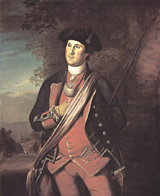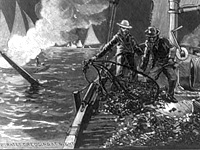New England Puritans

I am teaching The Scarlet Letter in my AP Literature class and need some higher-level resources that discuss the Puritan lifestyle, from dress to their interactions with natives to their belief systems. Do you know of several resources?
On the material culture of Plymouth Colony, including descriptions of housing, furniture, clothing, and family life and relationships, you could look at John Demos, A Little Commonwealth: Family Life in Plymouth Colony, or his, Remarkable Providences: Readings on Early American History. Also good is David Hackett Fischer, Albion’s Seed: Four British Folkways in America, section on “The Exodus of the English Puritans, 1629-41.”
Easily the most influential book about the New England Puritans' religion has been Perry Miller's 1956, Errand into the Wilderness. More recent and well-regarded books include Sacvan Bercovitch, The Puritan Origins of the American Self and David D. Hall, Worlds of Wonder, Days of Judgment: Popular Religious Belief in Early New England.
Online, Professor Donna M. Campbell’s valuable web pages on “Puritanism in New England” may help begin to clarify some of the Puritans’ religious beliefs.
Also online, you can find plenty to read and assign in volumes 1 and 2 of A Library of American Literature, edited by Edmund Stedman and Ellen Hutchinson, and compiled and published in 1887, and which is available via Google Books. The editors included diverse short selections from Puritan writers describing their inner and outer lives and their adventures in settling in America.
A newer anthology of Puritan writings, focusing exclusively on religion (and not available on the web), is The Puritans in America: A Narrative Anthology, edited by Alan Heimert and Andrew Delbanco, published in 1985 by Harvard University Press.
Teaching The Scarlet Letter and also reading historical works from and about the Puritans provides an opportunity to emphasize to students that Hawthorne's work was one of historical fiction, written almost two centuries after the events it imagined. Students can easily understand that the book is fiction because the specific people and events its described did not actually exist. They may need some help, however, in understanding that Hawthorne's Puritan world might differ from the real Puritans' world, or in understanding that Hawthorne's fictional enterprise was deeply imbued with mid-19th-century sensibilities and preoccupations. A 17th-century Puritan would never have written a book like it.
Sacvan Bercovitch, The Puritan Origins of the American Self. New Haven: Yale University Press, 1978.
David D. Hall, Worlds of Wonder, Days of Judgment: Popular Religious Belief in Early New England. Cambridge: Harvard University Press, 1990.
Alan Heimert and Andrew Delbanco, eds. The Puritans in America: A Narrative Anthology. Cambridge: Harvard University Press, 1985.
John Demos, A Little Commonwealth: Family Life in Plymouth Colony. 2nd edition. New York: Oxford University Press, 2000.
John Demos, Remarkable Providences: Readings on Early American History, rev. edition. Boston: Northeastern University Press, 1991.
David Hackett Fischer, Albion’s Seed: Four British Folkways in America. New York: Oxford University Press, 1989.
Perry Miller, Errand into the Wilderness. Cambridge: Harvard University Press, 1956


 Oysters became a high-demand source of protein and nutrition following the Civil War. With the rise of industry and of shipping by rail, canneries and corporate oyster farming operations sprang up on both coasts, eager to supply the working class, and anyone else who wanted the tasty shellfish, with oysters shipped live or canned. In San Francisco, a center of oyster piracy, the boom years of the oyster industry corresponded, unsurprisingly, with those of the oyster industry—both took off in 1870, as the state began allowing major oyster farming operations to purchase the rights to underwater bay "land" (traditionally common property), and petered off in the 1920s, as silt and pollution disrupted the bay's ecosystem.
Oysters became a high-demand source of protein and nutrition following the Civil War. With the rise of industry and of shipping by rail, canneries and corporate oyster farming operations sprang up on both coasts, eager to supply the working class, and anyone else who wanted the tasty shellfish, with oysters shipped live or canned. In San Francisco, a center of oyster piracy, the boom years of the oyster industry corresponded, unsurprisingly, with those of the oyster industry—both took off in 1870, as the state began allowing major oyster farming operations to purchase the rights to underwater bay "land" (traditionally common property), and petered off in the 1920s, as silt and pollution disrupted the bay's ecosystem. At 15, Jack London bought a boat, the Razzle Dazzle, and joined the oyster pirates of San Francisco Bay to escape work as a child laborer. London wrote about his experiences in his semi-fictional autobiography, John Barleycorn, and used them in his early work, The Cruise of the Dazzler, and in his Tales of the Fish Patrol. The latter tells the story of oyster pirates from law enforcement's perspective—after sailing as an oyster pirate, London switched sides himself, to hunt his former compatriots.
At 15, Jack London bought a boat, the Razzle Dazzle, and joined the oyster pirates of San Francisco Bay to escape work as a child laborer. London wrote about his experiences in his semi-fictional autobiography, John Barleycorn, and used them in his early work, The Cruise of the Dazzler, and in his Tales of the Fish Patrol. The latter tells the story of oyster pirates from law enforcement's perspective—after sailing as an oyster pirate, London switched sides himself, to hunt his former compatriots. The working class romanticized oyster pirates as Robin-Hood-like heroes, fighting back against the new big businesses' private control of what had once been common land. Traditionally, underwater "real estate" was commonly owned—anyone with a boat or oyster tongs could fish or dredge without fear of trespassing. Following the Civil War, states began leasing maritime "land" out to private owners; and the public protested, by engaging in oyster piracy, supporting oyster pirates, scavenging in tidal flats and along the boundaries of maritime property, and, occasionally, engaging in armed uprisings.
The working class romanticized oyster pirates as Robin-Hood-like heroes, fighting back against the new big businesses' private control of what had once been common land. Traditionally, underwater "real estate" was commonly owned—anyone with a boat or oyster tongs could fish or dredge without fear of trespassing. Following the Civil War, states began leasing maritime "land" out to private owners; and the public protested, by engaging in oyster piracy, supporting oyster pirates, scavenging in tidal flats and along the boundaries of maritime property, and, occasionally, engaging in armed uprisings.  The opera satirized Governor William Evelyn Cameron's second raid against oyster pirates in the Chesapeake Bay, on February 27, 1883. Cameron had conducted a very successful raid the previous February, capturing seven boats and 46 dredgers, later pardoning most of them to appease public opinion—which saw the pirates as remorseful, hard-working family men. His second raid, in 1883, went poorly. Almost all of the ships he and his crews chased escaped into Maryland waters, including the Dancing Molly, a sloop manned only by its captain's wife and two daughters (the men had been ashore when the governor started pursuit). The public hailed the pirates as heroes and ridiculed the governor in the popular media—the Lynchberg Advance, for instance, ran a
The opera satirized Governor William Evelyn Cameron's second raid against oyster pirates in the Chesapeake Bay, on February 27, 1883. Cameron had conducted a very successful raid the previous February, capturing seven boats and 46 dredgers, later pardoning most of them to appease public opinion—which saw the pirates as remorseful, hard-working family men. His second raid, in 1883, went poorly. Almost all of the ships he and his crews chased escaped into Maryland waters, including the Dancing Molly, a sloop manned only by its captain's wife and two daughters (the men had been ashore when the governor started pursuit). The public hailed the pirates as heroes and ridiculed the governor in the popular media—the Lynchberg Advance, for instance, ran a  Oyster piracy highlights the class tensions that sprang up during post-Civil War industrialization. Big business and private ownership began to drive the economy, shaping the lives of the working class and changing long-established institutions and daily patterns. Young people such as Jack London turned to oyster piracy as an escape from the new factory work—and the working class chaffed against the loss of traditional maritime common lands to business owners.
Oyster piracy highlights the class tensions that sprang up during post-Civil War industrialization. Big business and private ownership began to drive the economy, shaping the lives of the working class and changing long-established institutions and daily patterns. Young people such as Jack London turned to oyster piracy as an escape from the new factory work—and the working class chaffed against the loss of traditional maritime common lands to business owners.

